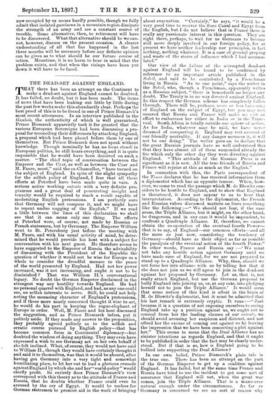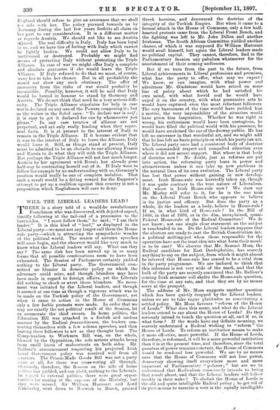THE DEAD-SET AGAINST ENGLAND. T HAT there has been an attempt
on the Continent to make a dead-set against England cannot be doubted. It has failed, no doubt, but it has been made. The items of news that have been leaking out little by little during the past few weeks make this abundantly clear. Perhaps the best proof of this is to be found in one of Prince Bismarck's most recent utterances. In an interview published in the Gaulois, the authenticity of which is well guaranteed, Prince Bismarck apparently took it for granted that the various European Sovereigns had been discussing a pro- posal for reconciling their differences by attacking England, a proposal which had been placed before them by one of themselves. But Prince Bismarck does not speak without knowledge. Though nominally he has no locus standi in European politics, he still hears everything, and it is quite impossible that he would have been deceived on such a matter. " The chief topic of conversation between the Emperor and the Czar, as well as between the Czar and M. Faure, must," said the ex-Chancellor, " have turned on the subject of England. In spite of the slight sympathy for the selfish policy of England, I fear that all these efforts at Peterhof have been made quite in vain. A serious active working entente with a very definite pro- gramme and a great deal of penetrating insight and tenacity would be required to reach a result capable of moderating English pretensions. I am perfectly sure that Germany will not compass it, and we might have to repent undue nagging of the English." If we read a little between the lines of this declaration we shall see that it can mean only one thing. The efforts at Peterhof were, of course, not made by Russian or French statesmen, but by Germany. The Emperor William went to St. Petersburg just before the meeting with M. Faure, and with his usual activity of mind, he deter- mined that he would provide his host with a subject for conversation with his next guest. He therefore seems to have suggested to the Emperor of Russia the advisability of discussing with the President of the Republic the question of whether it would not be wise for Europe as a whole to consider the dreadful menace to the peace of the world presented by England. Had not her power increased, was it not increasing, and ought it not to be diminished ? That was William IL's conversational legacy. No doubt the German Emperor disclaimed in the strongest way any hostility towards England. He had no personal quarrel with England, and had, as any one could see, no selfish interests to serve. Still, he could not help noting the menacing character of England's pretensions, and if those more nearly concerned thought it wise to act, he would do his part in keeping the rogue-elephant of Europe in order. Well, M. Faure and his host discussed the suggestion, and as Prince Bismarck infers, put it politely aside. If they made any answer to the proposition, they probably agreed politely as to the selfish and erratic course pursued by English policy—that has become common form in Continental diplomacy—but doubted the wisdom of doing anything. They may even have expressed a wish to see Germany act on her own behalf if she felt inclined. What, of course, they would not have said to William II., though they would have certainly thought it and said it to themselves, was that it would be absurd, after having got Germany into a very tight and somewhat humiliating place, to let her out to lead a glorious crusade against England by which she and her" world-policy" would chiefly profit. So entirely does Prince Bismarck's view correspond with this theory as to the attitude of France and Russia, that he doubts whether France could even be aroused by the cry of Egypt. It would be useless for German statesmen to promise aid in the work of bringing about evacuation. " Certainly," he says, " it would be a very good time to recover the Suez Canal and Egypt from the English, but I do not believe that in France there is really any passionate interest in this question. They are right there, perhaps, to wait for us Germans to become still more deeply involved in our foreign policy, for at present we have neither leadership nor principles, in fact nothing, nothing whatever. It is a case of general groping and waste of the stores of influence which I had accumu- lated."
Our view of the failure of the attempted dead-set against England will be found to be confirmed by reference to an important article published in the Soleil, and said to be contributed by a Frenchman living in Russia. " As to one point," says the writer in the Soleil, who, though a Frenchman, apparently writes as a Russian subject, " there is henceforth no longer any doubt. The Treaty is in no way directed against England. In this respect the German scheme has completely fallen through. There will be, perhaps, more or less hara,;sin!, of England on the subject of Egypt, but you may rest assured that Russia and France will make no sort of effort to embarrass her either in India or in the Trans- vaal. South Africa is totally outside our sphere of action. As for India, whatever may be said, we have never dreamed of conquering it. England may rest assured of our friendly neutrality. If any danger menaces it, it will not be our doing." The writer goes on to declare that the great Russian journals have so well understood this that they have almost all of them suspended already the fire which only the other day they were directing against England. " This attitude of the Russian Press is as significant as it is new. All the true friends of Russia and France will rejoice at this as much as the English."
In connection with this, the Paris correspondent of the Times declares that he has received information from a diplomatist which has an opposite tenour. When, how- ever, we come to read the passage which M. de Blowitz con- siders to be hostile to England, and to show that England is threatened, it does not appear to us to bear that interpretation. According to the diplomatist, the French and Russian rulers discussed matters on lines something like the following :—" We should not fear, if the case arose, the Triple Alliance, but it might, on the other hand, be dangerous, and in any case it would be imprudent, to confront a Quadruple Alliance. If, therefore, we cannot obtain the co-operation of the eventual fourth Power— that is to say, of England—our common efforts—and all the more so just now, considering the tendency of Germany—should have as their object as far as possible the paralysis of the eventual action of the fourth Power."
In other words, France and Russia say We must not take any hostile action against Germany until we have made sure of England, for we are not prepared to stand up to a Quadruple Alliance. Why, then, should we not force her into alliance with us by telling her that if she does not join us we will agree to join in the dead-set against her proposed by Germany. Let us, that is, not really attack England, but use the German proposal to bully England into joining us, or, at any rate, into pledging herself not to join the Triple Alliance.' It would seem that some notion of this kind is afloat in the brain of M. de Blowitz's diplomatist, but it must be admitted that his last remark is extremely cryptic. It runs :—" Just because it is a question of not exposing ourselves to seeing England take up a position against us, we ought not to conceal from her the leading clauses of our entente, we should avoid arousing her suspicion and distrust, and not afford her the excuse of coming out against us by leaving the impression that we have been concocting a plot against her." This seems to mean that the Dual Alliance has no sinister intentions as regards England, and that it ought to be published in order that the fact may be clearly under- stood. But if that is so, how is England going to be bullied into supporting the Dual Alliance ?
In our own belief, Prince Bismarck's plain tale is the true one. There has been an attempt on the part of the German Emperor to get up a coalition against England. It has failed, but at the same time France and Russia have tried to use the incident to get some sort of assurance that England will not, when the great war comes, join the Triple Alliance. That is a manceuvre natural enough under the circumstances. As far as Germany is concerned we see no sort of reason why England should refuse to give an assurance that we shall not side with her. The policy pursued towards us by Germany during the last few years forfeits all claim on her part to our consideration. It is a different matter as regards Austria. We should not like to see Austria injured. The real difficulty is Italy. Italy has been loyal to us, and we have ties of feeling with Italy which cannot be lightly broken. We could not allow Italy to be mxtitioned or destroyed. Probably we might find moans of protecting Italy without protecting the Triple Alliance. In case of war we might offer Italy a complete 3.nd absolute guarantee if she would leave the Triple Alliance. If Italy refused to do that we must, of course, leave her to take her chance. But in all probability she would not show any such obstinacy. The offer of immunity from the risks of war would probably be irresistible. Possibly, however, it will be said that Italy would be bound in honour to stand by Germany and Austria. We do not think that need be a very serious diffi- culty. The Triple Alliance stipulates for help in case war is declared on any one of the Powers composing it ; but as the writer in the Soleil says : " To declare war is nail; it is easy to get it declared for one by whomsoever you please." In any case treaties of alliance are not perpetual, and are only really binding when they repre- sent facts. It is at present to the interest of Italy to remain in the Triple Alliance. If it became evident that it was to the interest of Italy to leave the Alliance, Italy would leave it. Still, as things stand at present, Italy must be admitted to be an obstacle to our allowing France and Russia to do what they will with the Triple Alliance. But perhaps the Triple Alliance will not last much longer. Austria by her agreement with Russia has already gone half-way to contracting herself out of it. If Italy were to follow her example by an understanding with us, Germany's position would really be one of complete isolation. That such a result would be a fitting reward for the Emperor's attempt to get up a coalition against this country is not a proposition which Englishmen will care to deny.



































 Previous page
Previous page